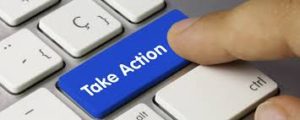AnxietyPath is a safe community environment supported by professional counselors. We are a free self help destination to receive support and guidance for recovery from anxiety and phobias
Anxiety Recovery Requires Action – Your Efforts Create Change
 Recovery requires action! Despite how we got to the point we are today, the only way out of it is to literally create change in our behavior.
Recovery requires action! Despite how we got to the point we are today, the only way out of it is to literally create change in our behavior.
I have nothing against talk therapy, but I have never met anyone that created recovery from anxiety disorders by just talking about it. On the other hand, I met many people over the years that spent countless hours with a therapist with minimal improvement in their recovery, and they came to me in search of something to help them.
This is not because the therapist wasn’t any good. But rather it is because recovery from anxiety disorders requires us to take action. Recovery is not created by an intellectual understanding. We cannot change our emotional response(s) to our triggers through an intellectual understanding. We can only create change in our emotional response(s) by learning how to manage them in the presence of our actual trigger. Recovery takes action!
When I was running a weekly support group at the treatment center, a gentleman showed up one week and participated. He stated that he had suffered from anxiety disorders for many years and no one has been able to help him. He stated this in a way that I felt that he was challenging my approach to recovery.
Throughout the entire evening, this gentleman took just about everything I said and referenced a book and author that had basically said the same thing. He did this to try to discredit what I was saying by using himself as an example as to why it didn’t work. By the end of the night I was kind of confused; on one hand I felt validated that what I was saying was in line with published authors, but on the other hand, I was trying to figure out how I was going to help this guy.
The following week the same gentleman showed up, and the night began almost exactly as the previous week. Once again he was rattling off book titles and authors, he was obviously very well read. But when he challenged my approach again I asked him a very simple question, “with all that you know, how come you continue to suffer from anxiety?” I did not ask this to be condescending or arrogant in any way, but I wanted an answer.
This guy knew as much as I did (if not more!). He certainly read more books than I ever did, knew more authors than I did, and his memory was clearly much better than my own to be able to recall specific books & authors (sometimes even specific chapters and pages).
My interaction with this gentleman opened my eyes to the basic approach to creating recovery; Recovery Requires Action!
This gentleman showed up several more times at my weekly support group, each week he made excuses as to why he couldn’t implement the tools & techniques I taught him. Or why self-care doesn’t work. Everything I suggested he found an excuse as to why he couldn’t (or shouldn’t) implement in his life. Needless to say, he never changed in the time that I knew him, and eventually stopped coming to the group.
After that experience, whenever someone came to my support group one of the first things I said was “this is a proactive approach to anxiety disorder recovery”. I wanted to make it perfectly clear that I was teaching how to create change. Most people that came to my group were able to make a significant change in their lives, and I can honestly say that I had many people create recovery using the information I am sharing with you here. But these people put into action what I was saying. They made the changes in their lives required to create change, and ultimately they created recovery! They understood that recovery requires action!
We have to slow down (or stop!) the “emotional drifting” which allows us to continue our anxiety driven behavior. We have to live “intellectually” and use the tools & techniques to manage our anxiety disorder(s).
“Emotional drifting” is responding to your emotions. In other words, if you do not feel motivated to do anything, you sit on the couch all day. This reinforces your emotional drifting. We don’t eat balanced meals because they taste good or they make us feel good; we eat balanced meals because we know it is healthy for us. For the most part, we have a sense of what is good for us, we typically know what should be done, when we allow our emotions to prevent us from doing the right thing we are emotionally drifting.
Being proactive and creating a schedule to make sure you remember to do everything you need to, and by practicing the tools & techniques, and implementing self-care, you will be living intellectually and will be able to create recovery. Recovery requires action!
Never give up! Persistence
Fear To Fearless
Categories
© 2020 AnxietyPath Powered by G SOUL INC